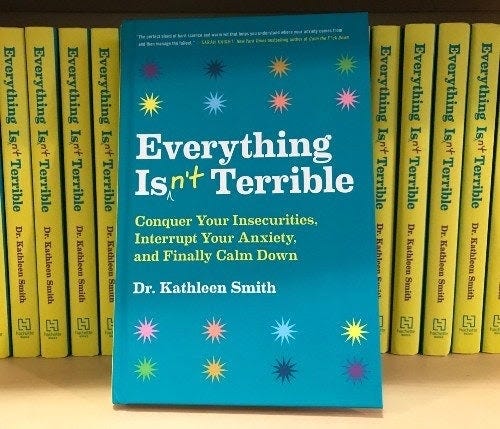Check my news at the bottom for an important announcement! - K
Chimpanzees can spend 20% of their day grooming and being groomed. This triggers the production of oxytocin, the neurotransmitter associated with love, cooperation, and other social behaviors within a group.
Fortunately, humans don’t have to shove our fingers in each other’s hair, or sniff people’s butts, to create these bonds. We have language. We can politely ask, “How have you been?” This is our social grooming.
I used to dismiss the banality of small talk. I became a therapist to get into deeper waters, talking about the challenges that really plague people. But short, personal inquiries about each other are an important glue in our society, families, and organizations. They bolster mental health and create trust in relationships. This is why you might ask after a person’s dog before jumping into a debate about quantum theory. It’s not just polite—it’s essential.
And every time I log onto a Zoom meeting, I do wonder what gets lost when all of these side conversations, these grooming sessions, are lost.
We also use social grooming to deescalate potential conflict. Lower-ranking chimpanzees will groom a higher-ranking one in an attempt to ward off an attack. Tension is moderated through repeated grooming sessions until things calm down.
To me, this demonstrates the power of contact over content. So often we trip ourselves up over needing the perfect solution to interpersonal problems. And when we don’t have the right answer, or the right words, we give ourselves the perfect excuse to distance from important people. To skip gatherings, or important meetings, to feel calm.
What happens in a group when distance is constantly activated as a mechanism to calm things down?
So much of maturity is about the capacity to hang in there in our relationships. Obviously, there are exceptions. But when I feel overwhelmed by anxiety in my family, or other groups, I remind myself that being present is the first, and perhaps most important, step.
Does contact solve everything? Of course not. But If I am not present, I don’t learn to manage myself in these relationships. I’m also more likely to rely on my imagination than reality. I assume people are mad at me, or annoyed by me, without much evidence. I feel less connected, and therefore am less invested in the success of the group.
What does “hanging in there” look like?
Showing up for important events, holidays, and meetings.
Making an effort to build person-to-person relationships.
Observing the level of anxiety and how people respond to it.
Trying to manage your anxiety instead of everybody else’s.
Listening to people’s thinking when you think you know better.
Letting people be responsible for themselves without your “fixing.”
This week, I’m challenging you to find opportunities for good old contact. Where and when do you need to be present, learning to ride the waves of the group’s anxiety? To share your thinking and hear other people’s thinking? Contact helps us see the reality of our relationships, their challenges and their strengths. When we’re always distancing, we give our anxiety permission to fill in the blanks.
Let me know how it goes.
News from Kathleen
ANNOUNCEMENT! I’m finally turning on paid subscriptions. Now that I’m finished with my next book, I’ll be writing weekly posts for my substack. Starting in September, the first and third weeks of the month will be free for all subscribers. All other weeks will be for paid subscribers ($5 a month or $50 annually).
Click the button below to sign up.
Other ways to support my work:
Leave a review of my book on Amazon. Reviews help people find the book.
Forward or share this newsletter to others who might be interested.
Want to read more of my writing? Get my book, Everything Isn't Terrible, from Amazon (Kindle version is $2.99 this week), Barnes and Noble, Indiebound, or your local bookstore (best option).
Want a free anxiety journal with the book? Calming Down & Growing Up: A 30 Day Anxiety Journal includes thirty daily prompts to help you reflect on and respond to your anxious behaviors. To receive a copy, just email me your receipt of Everything Isn’t Terrible.
Email me if you’re interested in Bowen theory coaching or want me to speak to your group or workplace. Follow me on Twitter, Facebook, or Instagram.
Want to learn more about Bowen theory? Visit the Bowen Center’s website to learn more about their conferences and training programs.





